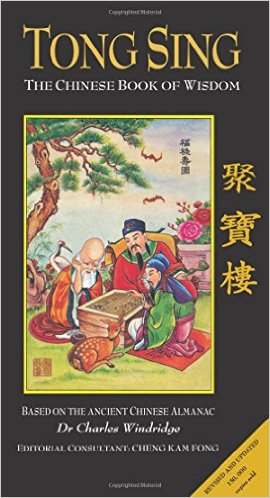A summary introduction to Chinese culture loosely based (at least in theory) in the Tung Shing or Chinese Almanac. As in the case of the American Farmers' Almanac, the Chinese Almanac is a mixture of calendar and information on all facets of Chinese life. However, as I said, the relation between this book and the original Tong Sing is, it seems, quite loose. Windridge's book is closer to the American Farmers' Almanac than to the original Tong Sing which, obviously, should not be taken as a criticism of the book. Judging from the information one can gather on the Internet, it looks as if the Chinese Tong Sing is mainly just that, an almanac (although with some additional advice on how to pick the days that will be more propitious for a happy wedding or a business deal, but little else). The American Farmers' Almanac, on the other hand, offers a far broader range of advice, ranging from weather predictions to astronomical data, humor, trivia, cooking tips, or fishing advice. So, it looks as if Windridge decided to mix both books and come up with a very sui generis Chinese Farmers' Almanac of sorts that somehow resembles more the American almanac than the Chinese one.
In any case, this volume offers a good (although very superficial) introduction to all sorts of things Chinese: geography, history, language, cooking, divination, religion, culture, cooking, health... It even includes a good amount of basic recipes, as well as some information on acupressure points, herbal remedies and the like. All in all, it is not a bad introduction. However, as I said, it is quite superficial, and anyone interested in learning more about Chinese culture should definitely look elsewhere. Windridge's book may prove the most useful when someone needs to carry around a small volume to consult some basics on the topic.
Additionally, although I am definitely no expert on the topic at hand, it would seem to me as if the author may have written a few inaccurate statements here. For instance, when discussing legends about tea, he states:
Yet, I have previously read the same legend in other sources ascribed to Bodhidharma during a period of nine years of meditation in a cave somewhere in Southern China, and not to Buddha himself. Likewise, there are a few other grammatical and typographical errors throughout the book, as well as inaccuracies such as this one I just described that are easy to spot by anyone vaguely familiar with the topic at hand (such as myself).Buddha cut off his eyelids so that he should not be disturbed in his meditations. A tea plant grew where each eyelid had fallen.
(p. 168)
On the other hand, it is quite refreshing, I think, that the author does not get so immersed in the story that he fails to point out the superstitious nature of many of the beliefs described in the book. Other authors tend to write paeans with little (or no) criticism at all. Windridge, on the other hand, appears to maintain a healthy dose of skepticism throughout the book.
In general, I found it quite interesting that a good amount of the traditional Chinese advice is pretty much undistinguishable from what I heard myself growing up in a Mediterranean country. For example, the following is one of the pieces of advice included in the section titled Health Hints:
It sounds quite reasonable indeed. The same can be said of this other piece of advice from the section dedicated to Traditional Chinese Medicine (abbreviated in the book as "TCM"):Adopt the Chinese diet. Failing that, ensure that your meals are balanced and varied, and consume more vegetables, fruit, cereals and fish, and less red meat, animal fats, sugar, salt and foods containing synthetic additives.
(p. 220)
TCM is based on the assumption that good health is not simply the absence of illness, but a state of fitness in which a person is full of vigour and purpose or, to use a Western idiom, "fighting fit and glowing with health".
Someone who is in a normal state of health can keep fit by having regular exercise, fresh air, a balanced and varied diet, moderate habits, some knowledge of those herbal medicines and other forms of therapy which may be used in the treatment of minor ailments, and enough common sense to consult a physician if he or she should become seriously ill or have doubts about their health.
(p. 223)
Incidentally, apropos this topic, the author maintains a position that is quite similar to my own: traditional medicine may be helpful to keep you fit and healthy, as well as to treat minor ailments, but you are better off consulting your regular physician for anything serious.
Entertainment: 6/10
Content: 5/10
